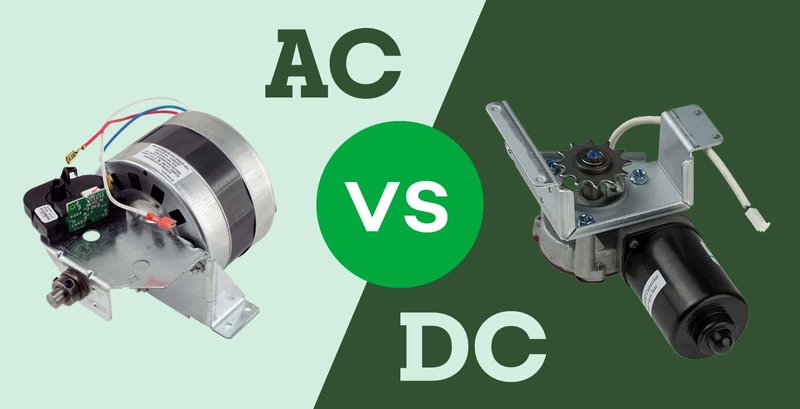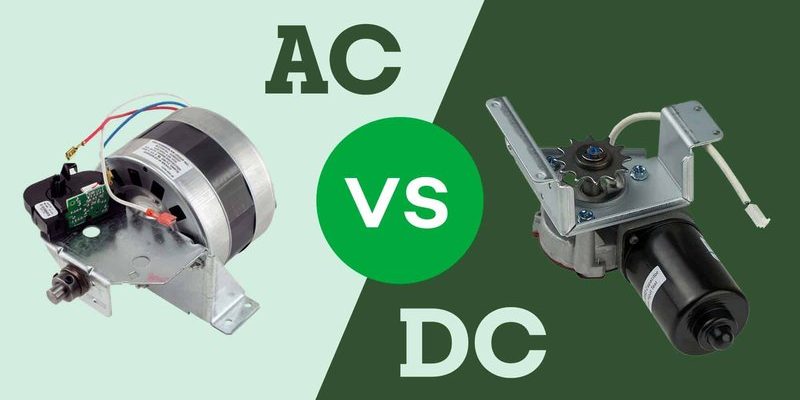
In the world of garage door openers, there are two main types of motor power: Alternating Current (AC) and Direct Current (DC). Each comes with its own set of advantages and potential drawbacks. If you’re a homeowner looking to replace your old opener or maybe install a brand-new one, understanding AC and DC can help you make a more informed decision. So grab a coffee and let’s dive deeper into this topic, keeping in mind popular brands like LiftMaster and Chamberlain, known for their innovative opener technologies.
Understanding AC Garage Door Openers
AC garage door openers are grounded in traditional technology. They typically operate with an electrical motor powered by the alternating current supplied by your home’s electrical system. Think of it as a steady and reliable workhorse—much like a family sedan that gets you where you need to go.
The most significant advantage of AC motors is their strength. They generate more torque, making them suitable for heavier garage doors. If your garage door is particularly large or has additional features like insulation, an AC opener might have the power needed to lift it efficiently.
However, here’s the thing—AC openers have a tendency to be a bit louder during operation. If your garage is attached to your living space, those clunky noises can become bothersome over time. Additionally, because they use more power, they might not be ideal for energy-conscious homeowners looking to save on electricity bills.
Delving Into DC Garage Door Openers
Now, let’s chat about DC garage door openers. These get their juice from direct current, which means they often come with a set of perks that align better with modern technology and eco-friendly practices. Imagine riding a sleek electric vehicle that glides quietly without sacrificing performance—that’s pretty much what a DC opener offers in the garage door world.
One of the biggest highlights of a DC garage door opener is its quieter operation. If you enjoy peace and quiet, you’ll appreciate how understated these units are. Plus, they’re typically equipped with soft-start and soft-stop technology, decreasing the chance of sudden jolts or stops that can wear down the door over time.
DC openers also tend to be more energy-efficient. They use less power when compared to their AC counterparts, which can help you save some money in the long run. However, they are generally less powerful, which might be a concern if you have a hefty door.
Power and Performance: A Side-by-Side Comparison
Now that we’ve dissected the basics of AC and DC motors, let’s compare them more closely in terms of power and performance. Here’s a handy table to visualize these differences:
| Feature | AC Garage Door Openers | DC Garage Door Openers |
| Torque | Higher torque makes it suitable for heavier doors | Lower torque, better for lightweight doors |
| Noise Level | Louder operation | Much quieter operation |
| Energy Efficiency | Generally less efficient | More energy-efficient |
| Soft Start/Stop Functionality | Typically lacks this feature | Usually includes smooth starting and stopping |
This comparison lays out the pros and cons quite nicely. If power is your primary concern due to a heavier door, an AC opener shines. But if you value a quieter, energy-efficient option, a DC opener would be your best bet.
Installation Considerations for AC and DC Openers
Thinking about installation? Both AC and DC garage door openers come with their own installation quirks.
AC openers are typically straightforward to install due to their traditional design, often using existing wiring. They’re a reliable choice if you’re on a budget or prefer a DIY project. On the flip side, DC openers might require a bit more thought during installation. Many come with smart features that may complicate the setup slightly.
Here’s a helpful tip: If you’re not comfortable with electrical work, consider hiring a pro. Even though you might save some cash by doing it yourself, improper installation can lead to more significant issues down the line.
Pricing: What to Expect
When it comes to cost, there’s a noticeable difference between AC and DC garage door openers. Generally, AC openers are more affordable upfront. You can often find reliable models starting around $150, making them a practical choice for budget-conscious homeowners.
DC openers, while often slightly more expensive—starting from about $200—bring greater value when you factor in their energy-saving potential and quieter operation.
It’s essential to remember, though, that quality varies across brands. So, whether you go for a budget option or a high-end model, read reviews and consider warranties.
Smart Technology and Features
Today’s garage door openers don’t just lift and lower doors. Many AC and DC models come packed with smart features that can greatly enhance convenience. Here’s a quick rundown of what you might encounter:
– Wi-Fi Connectivity: Control your garage door from your smartphone, whether you’re at home or miles away.
– Backup Battery: Ensures your door works even during power outages, giving you peace of mind.
– Safety Features: Includes auto-reverse technology to prevent accidents.
DC openers often lead the pack in incorporating these features thanks to their modern design. Keep an eye out for options that include smart technology suited to your lifestyle.
Choosing the Right Garage Door Opener for Your Needs
Now that you have a clearer picture of both motor types, it’s time to think about your specific needs. Ask yourself the following questions:
– What type of door do I have? Heavier doors might benefit from the power of an AC opener.
– How much noise can I tolerate? If noise is a concern, lean toward DC openers.
– Am I interested in smart features? Consider DC openers for their modern tech compatibility.
By considering these questions, you’ll be closer to making a choice that serves your household best.
Troubleshooting Common Issues
Every garage door opener, no matter the type, will encounter hiccups from time to time. Here are some common troubles and how to troubleshoot them:
– Door Won’t Open or Close: Check the power source and ensure the remote is working. If necessary, re-sync your remote to the opener.
– Noise Issues: If your opener is making unusual sounds, check for loose components or lubricate moving parts.
– Remote Not Working: Change the battery in your remote. If the issue persists, refer to your owner’s manual for pairing instructions or reset details.
Taking preventative measures and performing regular maintenance can help extend the life of your opener too.
Final Thoughts: Weighing Your Options
In conclusion, when it comes to choosing between AC and DC garage door openers, there’s no one-size-fits-all answer. Think about your door type, desired features, and how much noise you can handle. Honestly, both motor types have their strengths, so you just need to decide which matters most to you.
Making an informed decision leads to a smoother operating garage door, allowing you to kick back and enjoy the small moments in life without the annoyance of a malfunctioning door. Whether you pick an AC for its power or a DC for its efficiency and quietness, you’re investing in convenience and peace of mind. Happy door opening!
